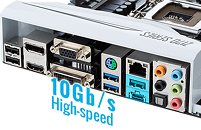Wednesday, June 22nd 2016

AMD "Zen" Processor Integrated Chipset Has USB 3.1 Issues, Could Escalate Costs
With its next-generation processors and APUs based on the "Zen" micro-architecture, AMD is integrating the chipset into the processor/APU die, making motherboards entirely chipset-free. This on-die chipset, however, is rumored to be facing issues with its integrated USB 3.1 controllers, according to industry sources. AMD sourced the design for the integrated USB 3.1 controllers from ASMedia. The company has a tendency of sourcing integrated controller IP from third-party manufacturers (eg: its SATA controllers and port-multipliers in the past have been sourced from Silicon Image).
Motherboard manufacturers are noticing significant drops in USB 3.1 bandwidths with increase in circuit distances (think wiring running from the AM4 socket to USB 3.1 front-panel headers on the bottom-right corner of a motherboard). Board designers are reportedly having to use additional retimer and redriver chips to get acceptable bandwidths over such ports, and in some cases even entire USB 3.1 controllers, eating into the platform's PCIe budget and escalating costs.AMD stated that the "Zen" processor platform is on-track, and the company will not comment on "customer specific board-level solutions." ASMedia played down the reports as industry rumors, and stated that its solutions passed the necessary certifications. The DigiTimes report adds that "AMD's Zen processors are seeing stable development and have a satisfactory yield rate, and about to enter the engineering sample stage in the near future."
Source:
DigiTimes
Motherboard manufacturers are noticing significant drops in USB 3.1 bandwidths with increase in circuit distances (think wiring running from the AM4 socket to USB 3.1 front-panel headers on the bottom-right corner of a motherboard). Board designers are reportedly having to use additional retimer and redriver chips to get acceptable bandwidths over such ports, and in some cases even entire USB 3.1 controllers, eating into the platform's PCIe budget and escalating costs.AMD stated that the "Zen" processor platform is on-track, and the company will not comment on "customer specific board-level solutions." ASMedia played down the reports as industry rumors, and stated that its solutions passed the necessary certifications. The DigiTimes report adds that "AMD's Zen processors are seeing stable development and have a satisfactory yield rate, and about to enter the engineering sample stage in the near future."

83 Comments on AMD "Zen" Processor Integrated Chipset Has USB 3.1 Issues, Could Escalate Costs
Still though, would a little pci-e usb card (which are cheap) not be a relatively simple solution?
Or am I missing something here?
It makes me think of a few of those Asus motherboards that did away with build in audio in favor of an included dedicated soundcard from Creative:
www.pcstats.com/articleimages/200801/asusblitzextreme_spcp.jpg
Cant they do something like that but with usb? or again, am I missing something?
i have 1 3.1 on my mobo and i, almost, never used it since i bought it (most my USB devices are 3.0 for storage or 2.0 for mouse keyboard)
also i doubt the issue would be critical for anything else than a storage solution using 3.1
edit: well the 3.1 of my mobo is a bit buggy actually ... it recognize at random my 3.0 thumbstick or my HDD enclosure and sometime, disconnect which never happen on the 3.0 (luckily since that board has 4 3.0(6 with front) and 2 2.0) so it's not only AMD it seems :oops: (joking ... it's not a story of performances loss ... that i would not notice since i have no 3.1 devices )
Besides its AMD, what else did you expect.
FYI, this is not an AMD "issue", it's an USB "issue", but why let the truth get in the way of a good AMD bashing, eh?At the end they even admit that it's a rumor...
I'm sure this isn't just about desktops. The silicon is usually common between desktops and notebooks (in different packages).
Imagine you have a Zen-powered notebook and your external graphics box isn't even getting 10 Gbps.Because that USB controller is on an AMD chip. Physically on the AMD chip. On the AMD processor die. It's part of the AMD on-die southbridge. AMD drivers will likely enable it as an open xHCI controller, without any ASMedia branding, just as AMD SATA controllers don't come with Silicon Image branding.
www.techpowerup.com/223163/amd-socket-am4-platform-demo-motherboard-pictured
Maybe it's not integrated at all, maybe it's that shiny metal AMD branded chip by the rear ports that houses the USB 3.1 controller?
Even if this issue is real, the problem isn't what's being discussed here.
USB 3.1 isn't broken and a good board layout, potentially with some additional components (which by the way is often used on poor USB 3.0 designs) will solve the rumored problem.
Also, a third party USB 3.1 host controller would circumvent this problem altogether, as it would work the same as it does in current Intel boards...
However.... What a big LOL-fuckup for AMD. Brand new chip and they cant even get the USB to work right? Paying some contractors for a design and just smacking it into their chip?! Wtf, why not just make your own and keep the profits. Lazy employees or what? I thought Jim Keller was some kinda god?! Why didn't he forsee this?
lol...